Fertile Acres

Has Carolina hit on a workable model for community-based treatment of mental illness?
by David E. Brown ’75
It’s Harnett’s, Moore’s and Cumberland’s 17-week birthday. But it’s not a holiday. They’re off on a business trip.
They meet their handlers in the parking lot and get into their working vests. They bound through the door, and within minutes their fans are filing in after them. The three chocolate Labradors are a tangle of leashes, eyes riveted on the hands that hold out Cheerios.
“Be nice.” “Can you shake?” And the inevitable “Down!”
For the retired residents of Carolina Meadows, just outside Chapel Hill, it’s traditional puppy therapy, but there is a twist: Their handlers also are in therapy — they are members of the community with serious mental illnesses.
A few miles to the south, at the Farm at Penny Lane, April is in the house — the henhouse — and she commands the attention of 19 Black Australorp hens (and a lone rooster). It’s a cold morning, and she can see she’ll need to put some coconut oil on the purple spot on Prince’s scarlet crown.
“How many eggs are they laying now?” a visitor asks. “None!” April says. “They’re spending all their energy staying alive!”
The joys and challenges of the hens are her domain.
On the first day of February, it’s like a blast furnace in the greenhouse, but outside it’s nearly perfect. Sally Haskett’s horticulture class sets up tables in the yard and begins learning the tedious process of testing onion seeds for germination rates. Then six of Penny Lane’s clients carefully plant seeds in cell packs full of rich soil. Next Monday, they’ll have some data on germination; the planted seeds will take longer.
“Anybody got any other news about plants?” Haskett asks around the table. Angie explains that her mother grows onions without soil. Heather announces, “My pansies got zapped.”
Later, there’s spontaneous singing and a lively exchange about Netflix shows as the group goes about their tasks. They are colleagues, students and friends, fully engaged.
“We’re a tight group. We’re a bonded group now,” Haskett says.
Creating and maintaining solutions to the needs of the mentally ill has been one of society’s hardest problems — particularly, it seems, when government is involved.
North Carolina, like many states, messed it up badly in the years following the movement to get clients out of institutions, casting about with good intentions but on the cheap. When the state shifted resources away from the counties, private companies swooped in and messed it up some more.
The U.S. Department of Justice has been unhappy about that for some time. Last fall, DOJ told the state — again — that North Carolina isn’t doing enough to help people with serious mental illnesses stay out of institutions by developing community-based therapy. The two reached a settlement in 2012, but the state is constantly under the threat that the feds will sue again.
UNC’s Center for Excellence in Community Mental Health is trying to build a new model that will work, some of it quite outside the box. The experiment is an infant — maybe a toddler — but it is quickly branching out in several directions, including a bold foray into housing.
Ol’ Car’lina has a farm.

April is queen of the henhouse, and Prince, by default, is prince. (He’s the only one of Penny Lane’s Black Australorp chickens not equipped to lay eggs, although April has observed him sitting on them.) Clients of the Center for Excellence in Community Mental Health learn to raise the hens as part of the center’s philosophy that nurturing living things helps build self-esteem and a sense of purpose. (Photo by Jason D. Smith ’94)
UNC adopts a menagerie
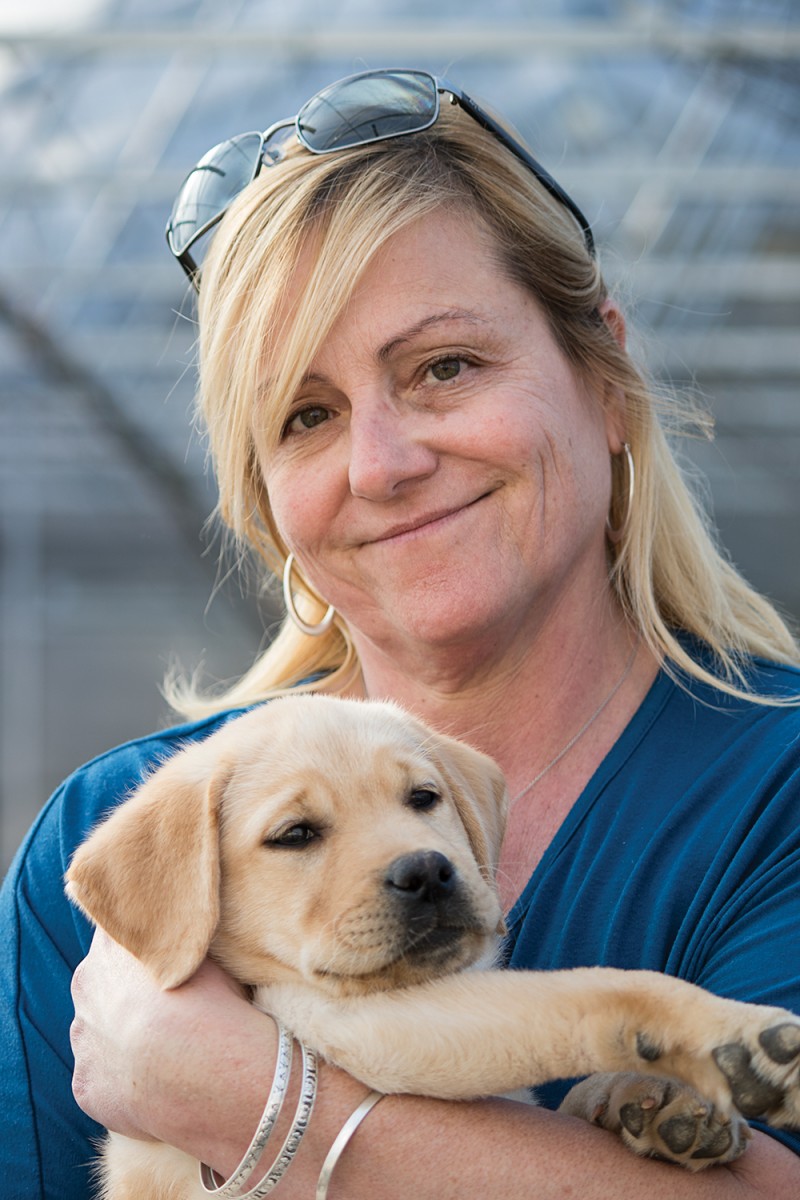
Sunny Westerman with Carmen. (Photo by Jason D. Smith ’94)
When you walk into Sunny Westerman’s shop, your troubles may not be over, but they cannot follow you inside the little building painted all over with silly puppies.
For the retrievers, this is a stop between a breeder in Wilmington and a prison in West Virginia, where they will get formal training to be service companions to military veterans with post-traumatic disorders.
Westerman guides clients in teaching the dogs basic behaviors that will be important in their advanced training. A lot of time is spent taking them out into challenging public settings (like the police station, the mall, the Pit). Volunteers pour in to give and take some love, and the center’s staff sneaks in when they need a little therapy themselves.
There’s not a lot Westerman needs to tell you about the value of this kind of bonding for people often desperate for ways to step away from their problems, to be a part of something that gives back.
“They love knowing these dogs are going to have a very important job, and they love contributing to that,” she says.
Slideshow: the puppies of Penny Lane Farm
The stars of the University’s video about the farm are — duh — the puppies. But they are just one part of a menagerie: chickens, bees, horticulture, a wellness program and the beginnings of a community of tiny houses. This is not an alternative to institutionalized care; it is the opposite. It is hands in the dirt, hands caring for plants and creatures and making things.
At the end of the rutted road that runs through a community in northern Chatham County is a collection of five wooden buildings, the leftovers of a former drug rehab center. A small garden started three years ago has grown to half an acre, and greenhouses have sprung up. The first of a cluster of houses, 28-feet-by-12-feet, is waiting to be set on its foundation.
This is not an alternative to institutionalized care; it is the opposite. It is hands in the dirt, hands caring for plants and creatures and making things.
Much of this is the vision of Thava Mahadevan ’92 (MS), who studied in UNC’s rehabilitation counseling program. He interned at the state mental hospital in Butner, then spent 10 years assimilating clients into the community through the Orange-Person-Chatham community mental health center.
As the state began paving the way for private providers about 15 years ago, Mahadevan watched as for-profit companies began turning community services into a grossly inefficient Medicaid-fed free-for-all.
He and 16 others from his agency created a nonprofit called Cross Disability Services, or XDS. They acquired the Penny Lane property — almost 40 acres — as it was approaching foreclosure in 2009 and got a grant to repair the buildings.
“What if we set up a farm? Go back to the basics, grow healthy food, get exercise, interact,” Mahadevan thought. But XDS was not surviving financially. In 2011, Dr. John Gilmore, medical director of the Center for Excellence in Community Mental Health, moved the company under the center’s umbrella, adopting all of its clinical services. Mahadevan became the center’s director of operations.
“This is where I think UNC can shine and be a leader,” Mahadevan said. “This can be replicated anywhere in North Carolina — better in some rural areas.”
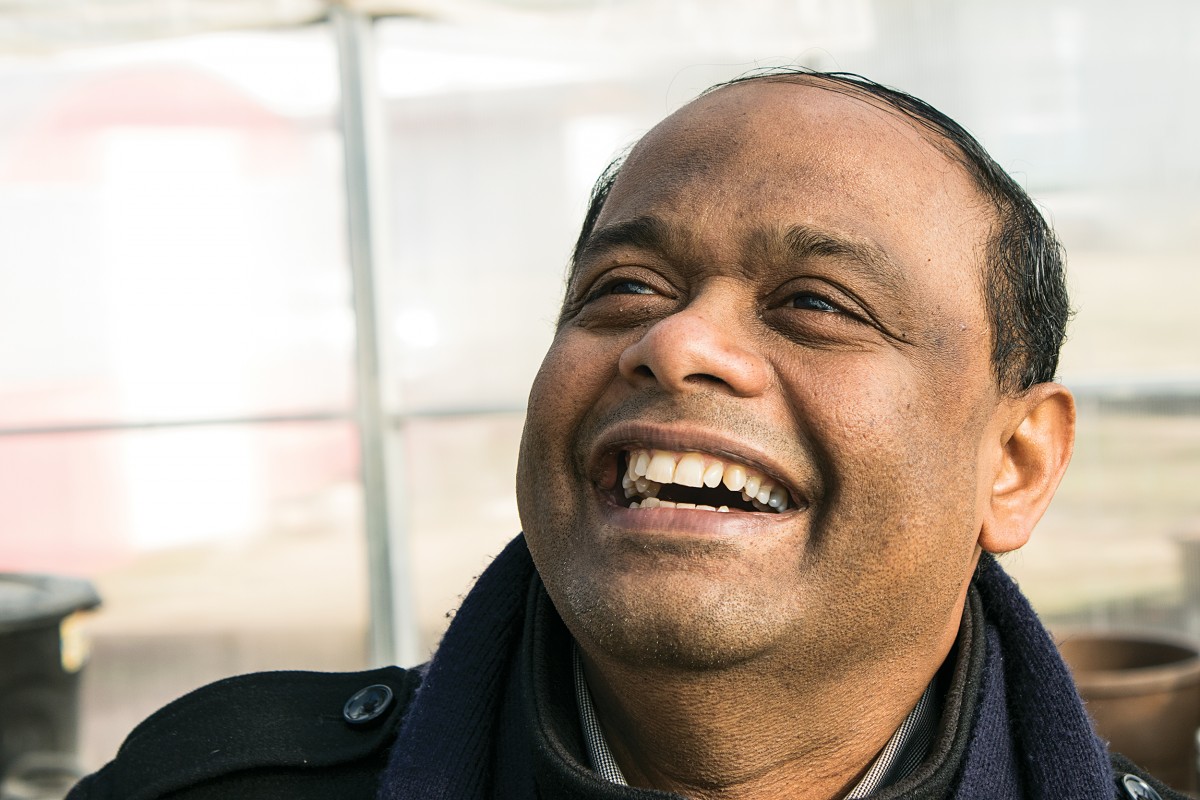
The people in charge of various components of the farm invariably point to the vision of Thava Mahadevan ’92 (MS), who came to the U.S. to study after his family escaped ethnic violence in his native Sri Lanka. After earning his master’s at Carolina in 1992, Mahadevan worked on the institutional side of mental illness, then spent 10 years assimilating clients into the community. The company he started to do that was taken in by UNC’s Center for Excellence in Community Mental Health, and he became the inspiration behind the Farm at Penny Lane. (Photo by Jason D. Smith ’94)
Getting hands dirty
“It’s all about the people, and if the plants get taken care of, terrific.”
Sally Haskett did landscape design for 25 years, then went back to school to study psychology and social work, then to the Horticulture Therapy Institute in Denver.
Mahadevan found her where she works now — at the N.C. Botanical Garden — as a horticulture therapist working mainly with the retirement community. Now Haskett brings her therapy to the farm, funded part time by the Center for Excellence in Community Mental Health.
“He’d really like to have me out here every day of the week,” she said.
People with acute mental illness often are not employable and may be detached from their families. Outside an institution, they can get lost. “Their symptoms are under control with medication, but they’re not living a life,” Mahadevan said.
Haskett started horticulture classes at the farm in 2014. Clients study the process from growing plants from seed to selling at the Fearrington Village farmers market.
But it is the experience, not the product, that matters. “Once somebody gets involved in that process, it’s an avenue of self-discovery,” Haskett said.
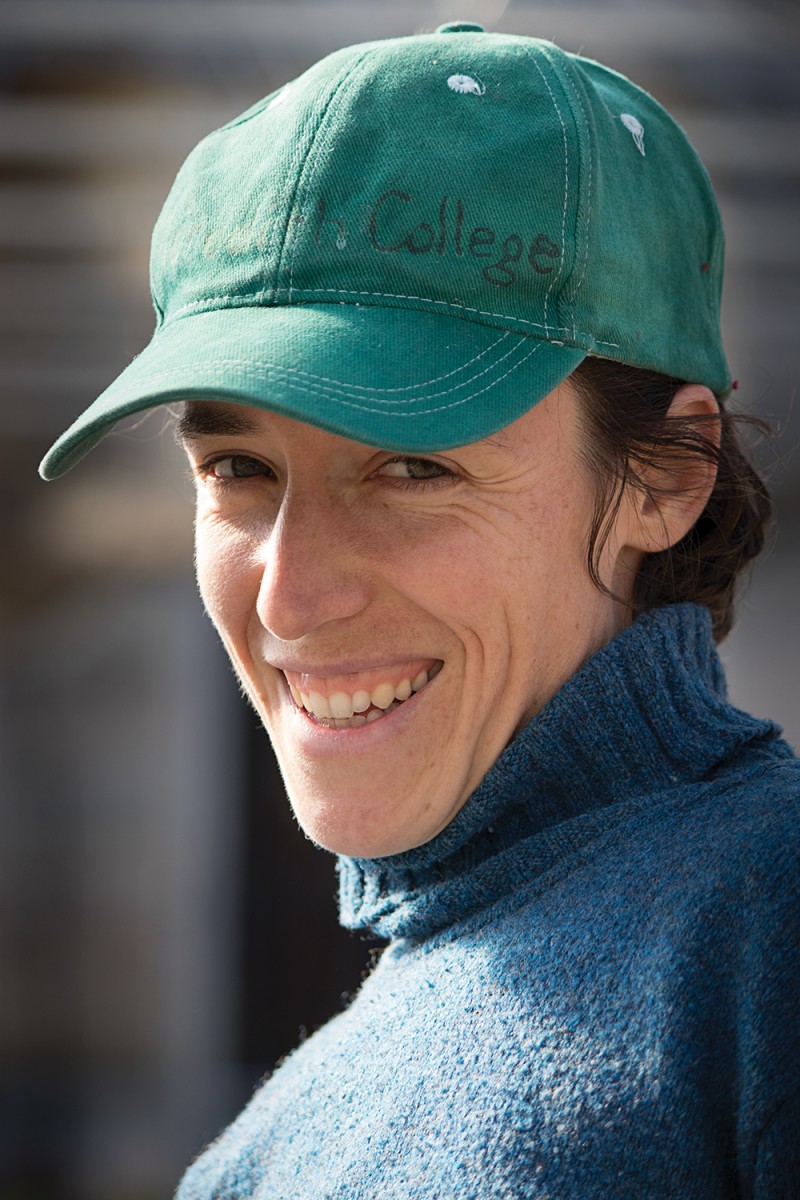
Jessamine Hyatt ’03. (Photo by Jason D. Smith ’94)
Jessamine Hyatt ’03 began studying sustainable agriculture 10 years ago. Since July she’s been on contract as Penny Lane’s farmer — planning the planting schedule, researching and ordering seeds, preparing soil for leafy greens, root and fruiting vegetables and onions, garlic, broccoli and strawberries. And Hyatt has to know when to shift to a client’s needs and set the farm’s goals aside.
Like several on the staff, she came to Penny Lane as a volunteer. “For me, it has a lot to do with the effects on the body of being outside, the effects on the body and the mind of being around plants,” she said. “It’s the kind of place where you can leave your worries behind somewhat.”
While clients are getting their hands dirty, they’re in the fresh air, getting physical activity, building motor skills and interacting with others. They’re stimulating the senses and improving self-esteem through creative and useful work.
While clients are getting their hands dirty, they’re in the fresh air, getting physical activity, building motor skills and interacting with others. Beyond that, Haskett says, they are getting in touch with the natural order, stimulating the senses and improving self-esteem through creative and useful work.
One client was found to have a committed connection to plants, though she was less inclined to interact with people. Now she is at Central Carolina Community College in Pittsboro, taking horticulture classes. “She’s crossed over a lot of barriers to do that,” Haskett said. “She aced a presentation to a class” last spring. “Sometimes we get involved in education and we don’t know what’s going to come of it. There’s a sense of community, sense of purpose. How do I fit into the world?”
Mindfulness and movement
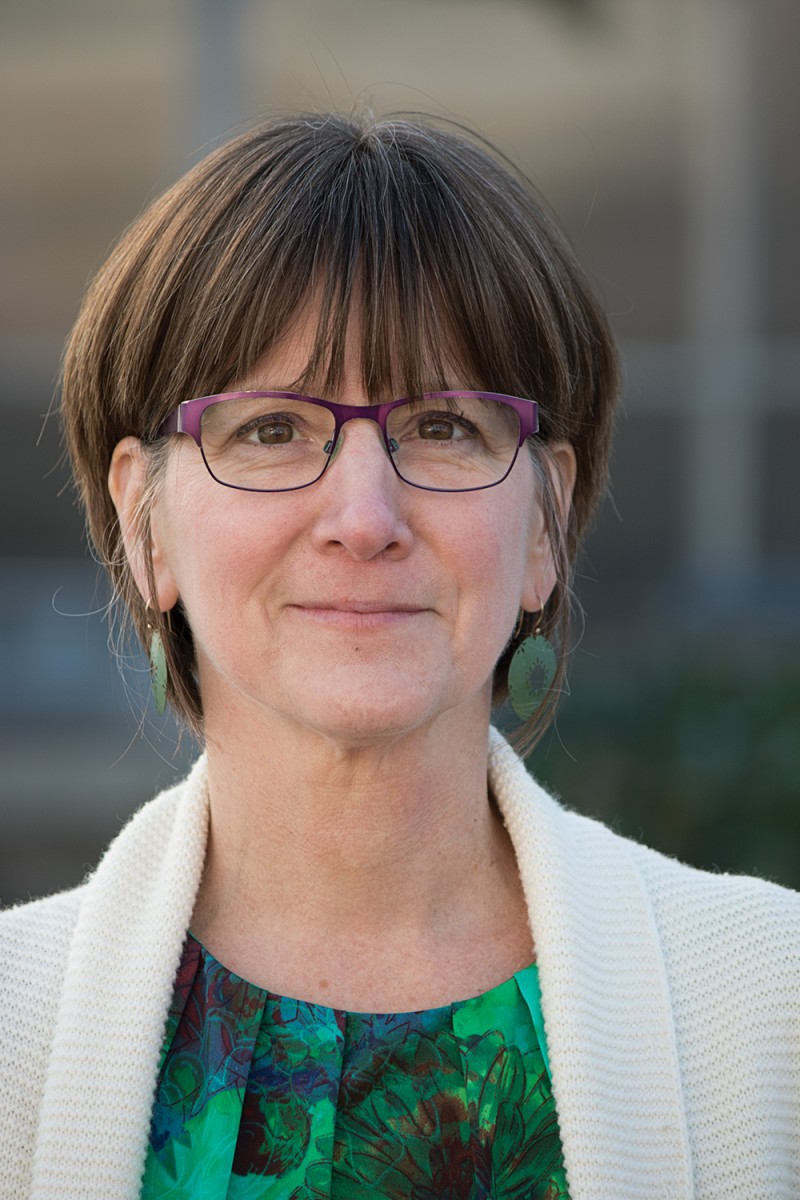
Lisa Goldstein ’91 (MPH). (Photo by Jason D. Smith ’94)
When Lisa Goldstein ’91 (MPH) was in nursing school, the profession was disease-based — “wellness” was not a thing yet, but she and others took a new track in the discipline. “We were seen by the other nursing students as not real nurses.”
An artist, Goldstein started volunteering at Penny Lane a year ago. Now she’s employed for 10 hours a week by the Center for Excellence, but she’s working more than that to get a wellness program off the ground.
The side effects of the medicines that are vital to controlling mental illness symptoms can be dealt with if you have a healthy lifestyle — but that’s what its sufferers don’t have.
Many live alone and are lonely, with a paltry income that leaves them vulnerable to stress, obesity and habits like smoking. They don’t eat well, don’t exercise and don’t get preventive health care.
People with serious mental illness live 28 fewer years than the average person, according to the center’s statistics. Between 30 and 40 percent of the people who go to the emergency room at UNC Hospitals have some mental disorders.
When you look for Goldstein’s tiny office in The Lodge at the farm, the first thing you notice is the old upright piano. It’s there for anyone to play. In January, she started eight- to 10-week classes that minister to the mind, the body and the spirit.
“Our clients have limited resources,” she said. “They’re isolated and compromised. The medicine and psychotherapy gets them to a level of recovery — we can take them to the next level.”
The program has five components: mindfulness, via meditation; movement, such as working on the farm, walking its trails and possibly yoga; learning anti-stress practices that become skills; healing arts — horticulture, art and music; and wellness education.
Everything is designed to get clients thinking that someday they might teach these disciplines to others.
Penny Lane is far from fully realized. Goldstein dreams of a clay studio. She wants a labyrinth. Enclosed space for work and for social events.
“The goal is to have a place where people can come and spend the whole day. If nothing else, they come and feel good about themselves and create — have a creative life, a sense of self-worth and purpose.”
The most basic: A house
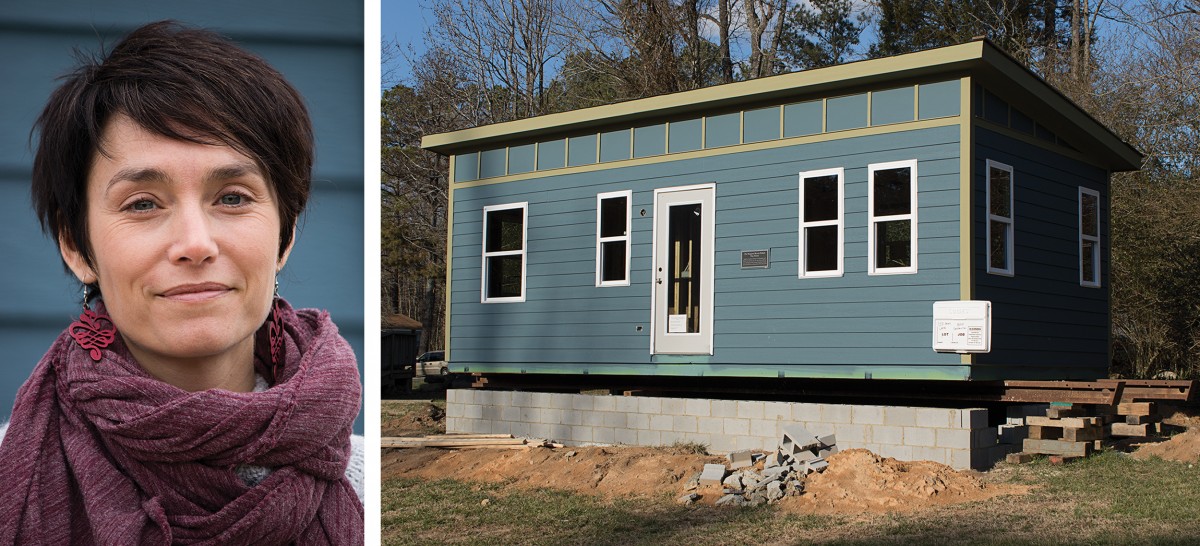
Left: Rebecca Sorensen ’15 (MSW). Right: The “tiny house” movement is catching on in lots of places, and the people at Penny Lane believe it offers a workable solution for those with mental illnesses for whom apartment rent exceeds their income, forcing many onto the streets. The challenges are many: zoning rules that vary by location, road improvement requirements and transportation. But a 336-square-foot house such as this one, pictured at left, just up the hill from the farm’s greenhouses, is expected to cost a client just $250 a month, utilities included. It was built by volunteer contractors in front of the public at the Chatham County Fair. Several clients will take turns trying it out, and their feedback will be used to tweak the program as Penny Lane works toward a community of 10 houses — and toward spreading the model to other communities. (Photos by Jason D. Smith ’94)
Rebecca Sorensen ’15 (MSW) has a son who has autism and epilepsy; now that he’s 19, the issue of housing for people with disabilities has become very real for her.
Over a breakfast that’s cooling rapidly because she can’t stop talking about this, Sorensen is succinct: Puppies and wellness are great, but they’re not worth much if you don’t have a place to live — and this is problem No. 1 for the mentally ill. Because many of them are not capable of holding a job, many live on a government stipend of $720 a month. The cheapest apartment — even a spot in a group home — costs 100-plus percent of that.
Sorensen worked for 18 years in case management for people with developmental disabilities, then entered UNC’s School of Social Work. She started volunteering at Penny Lane, took her master’s internship there and went to work as a contractor for Mahadevan’s nonprofit last May. The two of them and farm manager Michelle Morehouse were thinking about the housing problem and the “tiny house” movement, and they thought fast.
With donated materials and construction labor and a couple of grants, a 336-square-foot house was built during the Chatham County Fair in September — where all of the county could see their idea. It was moved to the farm to be the first of a planned community of five, then 10, then who knows how many, within a short walk of the farm’s other facilities.
The preliminary math says a person or a couple can live in one of these houses for $250 per month including utilities.
“People with mental illness tend to retreat from a community that doesn’t understand them,” Sorensen said. “Here they can live in a more supportive community. I feel like it could be a real game changer for a lot of people.”
Farm staff were thinking about the housing problem and the burgeoning ‘tiny house’ movement, and they thought fast.
Now begins a research phase — the Penny Lane people do not know of a model for this (other than private developments way beyond affordability for most).
UNC’s department of city and regional planning is studying zoning rules that will come into play — and which vary maddeningly from county to county. The division of occupational sciences in the medical school is looking at the practical aspects of living in a small space — what needs modifying?
“There are so many eyes on this project, it’s important for us to do it very thoughtfully,” Sorensen said. “What we want is for this to be a replicable model.”
Survive to thrive
Among the chickens and canines and bees and the dreamers and doers at Penny Lane, there is a psychiatric team, too.
Dr. Carol VanderZwaag saw the first wave of de-institutionalization of the mentally ill in the 1960s and ’70s from the vantage point of Umstead Hospital in Butner, and she saw the second wave in the ’90s.
Around the turn of the century, she started working in assertive community treatment for people who had been in hospitals or were at risk for being hospitalized — trying to replicate on the outside the kind of care they got inside.
“It’s not a medical model, it’s a life model,” she said, “from what’s needed to survive to what’s needed to thrive — independence, or as close [to it] as you can get. It’s when you go to bed at night, you had a good, meaningful day.”
VanderZwaag was part of the startup of Mahadevan’s nonprofit, and now she works for the Center for Excellence as medical director for community services, heading a team of about 15 that includes nurses, job counselors, substance abuse specialists and others. They meet together every day at the farm but spend most of their time fanning out into the community to serve some 100 of the most severely ill where they live.
She has been through all the state’s struggles, the waste of millions of dollars, the absence of watchdogs. Hearts probably were in the right place, she believes, but you can’t change course every six months — thus the critical importance of finding what works.
There’s no comparison between an office on campus and being on the farm. The value to clients “is being able to step outside your world and your problems. Now [they] have something to give back and to share with others. They’re part of something bigger than themselves. A lot of my [clients] have lost that.”
Neighbors
The Farm at Penny Lane lies just to the southeast of the supersized, neatly ordered Briar Chapel residential development, and the connection is palpable.
Work days find lots of Briar Chapel volunteers at the farm; Penny Lane might connect its walking trail to the subdivision’s greenway and might be able to link to its water and sewer system; because of the proximity, Chatham’s fledgling bus system will have a stop a short walk from the farm, and that will be a huge help with its clients’ transportation issues.
Chapel in the Pines, built by University Presbyterian Church to serve North Chatham’s growth, has made the farm a significant beneficiary of its capital campaign and hosted 50 or so people for its Thanksgiving meal. “Poverty, children and mental illness are our three focuses,” said the Rev. Mindy Douglas, pastor of Chapel in the Pines. “We found this happening in our backyard. It has to do with our call to be stewards of creation.”
‘We don’t let people be defined by their diagnosis. And we have lots of people clamoring to learn how to do this in other places in the state.’ — Michelle Morehouse
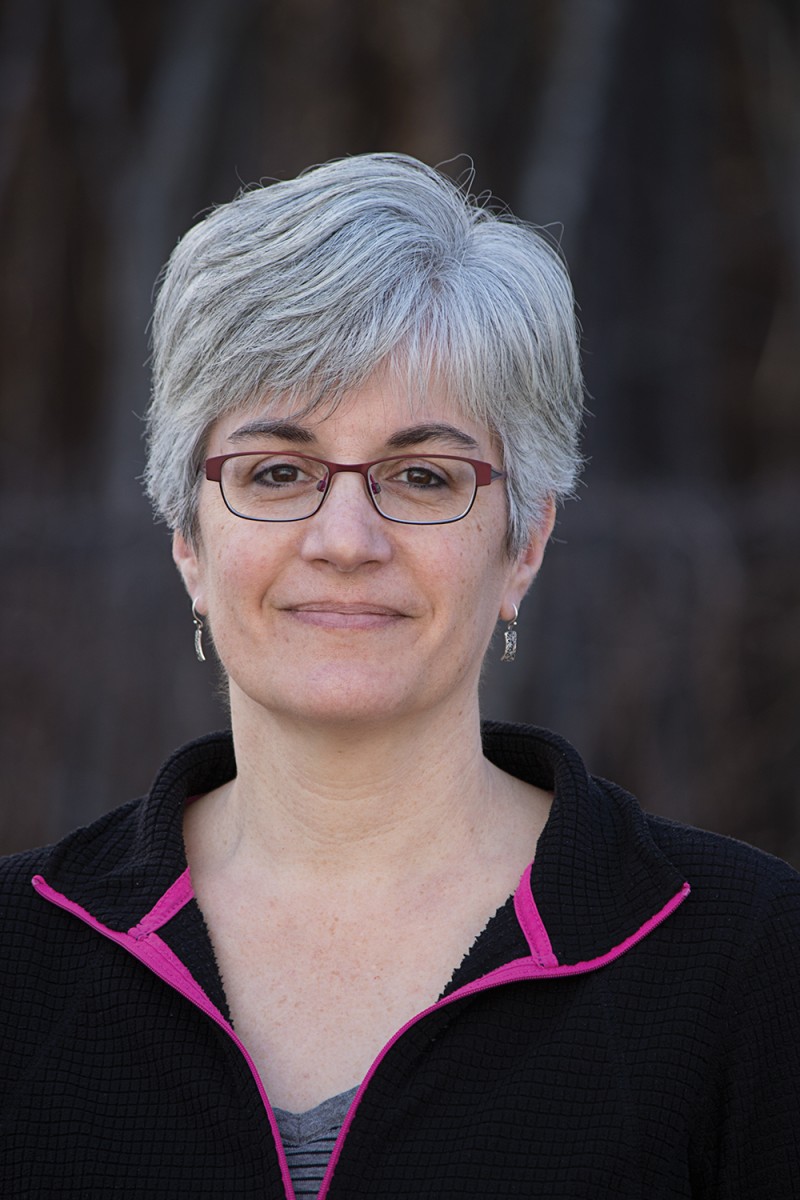
Michelle Morehouse. (Photo by Jason D. Smith ’94)
Michelle Morehouse found the farm through the church four years ago. With a background in social work, hunger relief and nonprofit program development, she now is the farm’s manager.
“On a work day, you won’t be able to tell the difference between those who have a mental illness and those who don’t,” Morehouse said. “It’s a unique model, new and different, a sorely needed place in the community. We don’t let people be defined by their diagnosis.
“And we have lots of people clamoring to learn how to do this in other places in the state.”
Mental health professionals regularly point to three critical needs of the system: housing, vocational training and a sense of community.
Mahadevan believes that “we’re very much in line with what the Department of Justice is counting on the state to do.” But the jury, he agreed, is still out. And the funding model is far from clear: You can’t bill Medicaid for this, as you can with more traditional care, even if the traditions haven’t worked.
“The model is not finished, so it’s hard to get funded for it — yet,” he said. The Center for Excellence in Community Mental Health was created with grants from the Duke Endowment and the Kate B. Reynolds Charitable Trust. Many of the farm’s programs are sustained by one-time grants.
Mahadevan said: “Once there was a path — the emergency room, inpatient, community mental health program. Then the path ended. We provided the next step. What a great gift the University can give back to the community.”
A random assemblage of simple wooden buildings, seeds growing, a rooster crowing, the start of a tiny residential community. Puppies. Someday a big barn for gatherings, food storage and packing facilities, more movie nights, bonfires and potlucks.
This, too, is the University.
David E. Brown ’75 is senior associate editor of the Review.
Watch a video about the Farm at Penny Lane at alumni.unc.edu/PennyLaneFarm and a video about horticulture therapy at UNC at ncbg.unc.edu/horticultural-therapy.
Thanks for reading the Carolina Alumni Review
Carolina Alumni members, sign in to continue reading.
Not yet a member? Become one today.





















